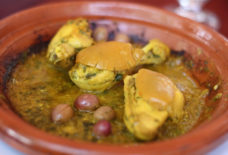Enjoy the Show: Students Explore Nuances of Syrian Culture, Language
SOURCE: DAVIDSON
BY: BRIDGET LAVENDER
Visions of the past, present and future of a nation play out on television screens across Syria. The dramatic miniseries, or musalsalat, blossomed into a venue for political and social opposition prior to the Arab Spring uprising and now offers viewers a bridge to Syrian culture at a time of intense upheaval.
“Despite the mass media attention the Syrian tragedy has generated, Syria remains an enigma,” said Associate Professor and Chair of Arab Studies Rebecca Joubin. “I believe Syria’s entertainment industry provides powerful insight into the political and social climate of Syria, both before and after the uprising.”
Taught entirely in Arabic, Joubin’s course “Gender & Sexuality in Syrian Television Drama” examines Syrian miniseries’ as a primary arena for the expression of post-colonial Syrian culture and artistic talent.
After political parties were banned in the 1960s, many Syrian activists turned to television. Recognizing the power of the miniseries as a medium to reach the masses, talented journalists, novelists and poets seized the opportunity to write for these shows.
“Storytelling and duplicitous grand narratives have been specialties of the Syrian Ba‘th party since its rise to power in the early 1960s,” Joubin said. “Many Syrian drama creators worked against the regime’s dominant narratives through the lens of gender, marriage and sexuality.”
CONVERSATION PARTNERS
To shed light on some of the culturally specific nuances of the shows, Joubin arranged for students to supplement their viewing with regular Skype sessions with Syrian conversation partners.
The three conversation partners–Zane, Shadi and Mona–connected to Davidson through NaTakallam, an organization that hires Syrian refugees, many of whom are struggling financially, to teach Arabic to students via Skype.
For 10 weeks of the semester, students discussed the shows with their assigned conversation partner during 30-minute Skype sessions.
“There are no subtitles, and each show is so didactic and intentional about critiquing some aspect of history, culture and politics,” Joubin said. “Prior to the uprising, these miniseries would draw millions of viewers and were topics of conversations at coffee shops all through the month of Ramadan.”
When students discuss pre- and post-uprising miniseries with their Syrian language partners, Joubin said, they get a sense of the context from individuals who have watched these shows with their families–which is critical to their understanding and analysis.
Emma Slater ’21, who transferred to Davidson to study Arabic, said the NaTakallam conversation partners have been key to understanding the informal or regionally specific language in the shows.
“A large amount of the vocabulary we learned is actually not written or found in dictionaries, although it is widely used in everyday speech,” she said. “Learning from native speakers is essential to building a practical understanding of any language, and it has been particularly helpful in trying to understand the cultural nuances and politics that are central in each episode.”
The conversation partners’ connections to the Syrian artist community informed their work with students. Slater’s partner, Zane, graduated from the theater school where an episode of the series “Spotlight” was filmed.
“He was able to explain to me what it was really like to be a theater student in the world that the actors portrayed on screen and offered me his own critique on the accuracy of their depiction,” she said.
Syrian student Hani Zaitoun ’20, who fled to Germany before arriving at Davidson through an international education consortium partnership, also met with students from the class on a weekly basis.
“I watched the episodes with them,” he said, “and made sure they were acquainted with the background of the episode in terms of the social, cultural or political issues.”
EXPLORING LANGUAGE
Along with cultural context, Zaitoun and the conversation partners helped students practice the Syrian dialect of Arabic, which is notably different from the Modern Standard Arabic students learn in class.
“The biggest challenge when watching these shows is transitioning from modern standard formal to colloquial Syrian Arabic,” said Grace Covelli ’19. “Most of my conversations with Zane began with us translating words I didn’t understand.”
Covelli, a biology major and Arabic Studies minor who hopes to volunteer with Syrian refugees, said she is determined to master the dialect.
For Slater, Joubin’s approach to the language factored heavily into her decision to alter her college plans.
“I was particularly interested in the program here because of Dr. Joubin’s expertise in Syrian Arabic and her integration of the spoken dialect into the curriculum,” Slater said. “It is unusual for undergraduate programs to provide opportunities like this to focus on a specific dialect.”
With deep ties to a community of Syrian intellectuals fostered during years of fieldwork and an extended residence in Damascus, Joubin is uniquely positioned to guide students in their cultural and linguistic explorations.
“I am in continual contact with these Syrian intellectuals who generously share their perspectives with me,” Joubin said. “I have seen how important it is to speak to Syrians about the context of these miniseries. I was thrilled that the NaTakallam partnership could offer the same opportunity to my students.”









